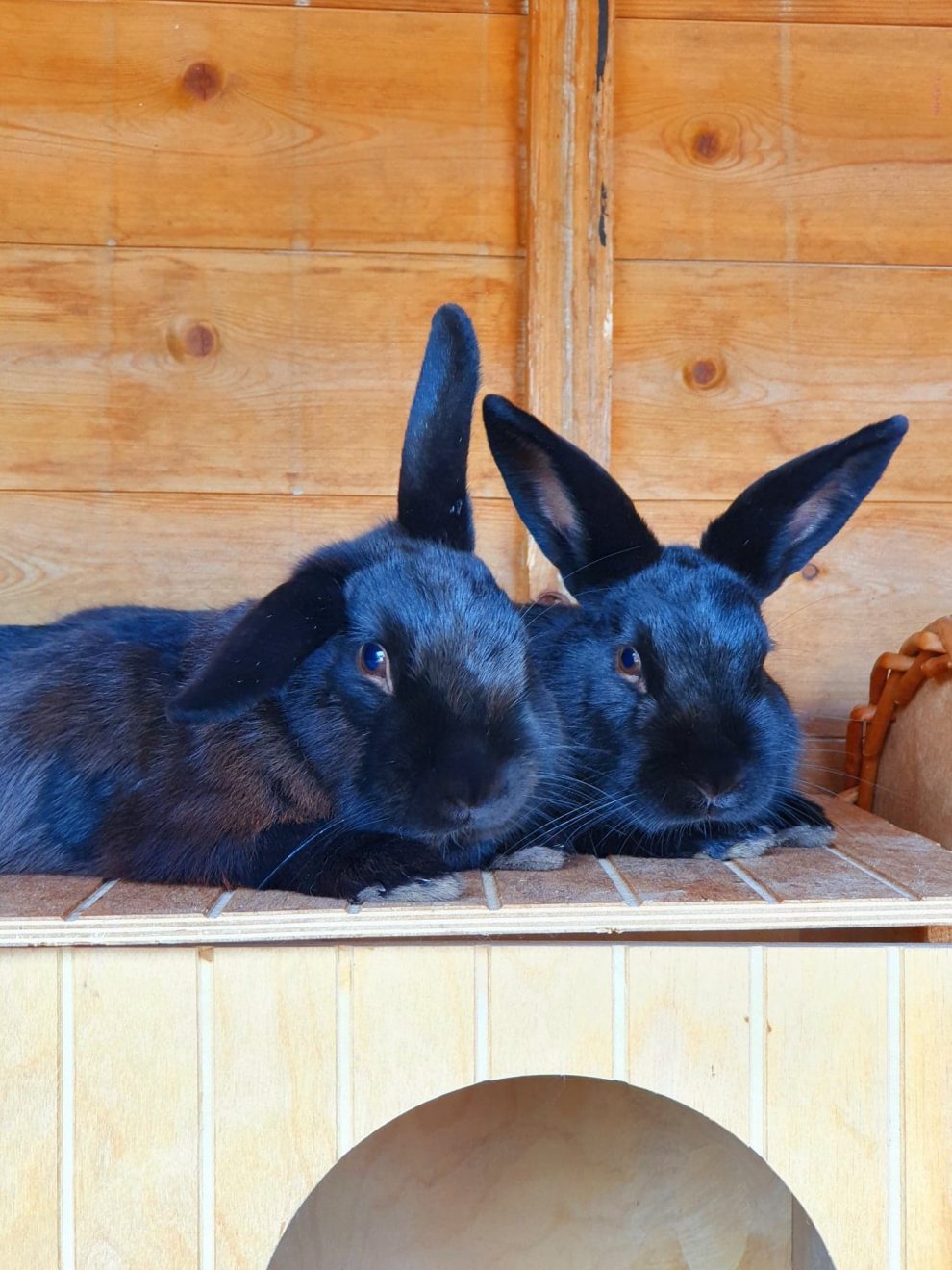OWNERS are being urged by the RSPCA to neuter their pets to help control a surge in unwanted rabbits that need rehoming from animal rescue centres, after the number of rabbits coming into the charity’s care increased by a shocking 48 per cent.
The Rabbit Awareness Action Group (RAAG) – which includes the RSPCA and several other charities, including the Rabbit Welfare Association and Fund (RWA&F), plus pet food provider Burgess Pet Care – is reminding pet owners of the benefits of neutering their pets, which include cutting the numbers of accidental litters and reducing the risk of serious illnesses, such as uterine cancer in female rabbits.
Animal centres are bursting at the seams with abandoned and unwanted rabbits; while at the same time many owners have found their bunnies breeding out of control, sometimes because they have been sold missexed pairs.
In it’s 2021 PAW Report*, the PDSA found that 37 per cent of the 900,000 pet rabbits living in the UK in May 2021 were not neutered. World Spay Day on Tuesday, February 28 is aimed at educating the public of the importance of neutering their pets.
The Rabbit Welfare Association and Fund advises owners that male rabbits can be castrated from 10 weeks, while females can be spayed from four months. By doing so it means owners can keep their rabbits in pairs or groups and help prevent serious health and welfare problems developing.
The RSPCA and other RAAG charities deal daily with the problems caused by unwanted litters and the numbers of rabbits arriving at RSPCA animal centres increased by 48 per cent to 1,090 last year compared to 2021. The charity’s branches also dealt with 1,942 unwanted rabbits during 2022.
Last year RSPCA Kent-North West Branch was hit by the unexpected costs of caring for an extended family of bunnies after their former owners had failed to neuter the parent rabbits.
The branch took in two adult rabbits, Sarah and Hector (pictured, above) and their three offspring, Johnny, Meena and Ash, but within days their attempts to neuter the parents were frustrated. They found that Sarah was already pregnant again and she later gave birth to Box, Fidget, Toast, Crumbs and Kanga as the family’s numbers soared to 10.
Branch manager, Becky Blackmore recalled: “Sarah and Hector were only 10 months old themselves but had already had a tough life and were left together unneutered. We soon had 10 rabbits from this one original pair, all of which needed neutering and the babies had to stay with us until they were old enough for this to happen.
“What started with just a pair of pet rabbits in a hutch in a garden snowballed – and without neutering and responsible ownership, this is a problem we expect to see again and again.”
It took the branch nearly a year to rehome all the rabbits, yet had the parents been neutered in a timely manner thousands of pounds would have been saved on the costs of neutering as well as vaccinations and microchipping, which were all covered by the branch.
Staff at RSPCA Bryn-y-Maen Animal Centre were grappling with an influx of 19 rabbits who had been housed in unsuitable conditions at a property. Among the rabbits taken in by the centre at Colwyn Bay in North Wales were two unneutered female rabbits who went on to have litters totalling 14 babies.
Bryn-y-Maen manager Victoria Williams said: “Currently, we have a rabbit called Valentina (pictured) that had three newborn babies when she was found abandoned in a box. She has recently given birth to another litter, so she must already have been pregnant again when she was abandoned.
“They are all being kept at private boarding accommodation, but we hope to be able to admit this growing family to Bryn-y-Maen soon.”
The benefits of neutering rabbits far outweigh the very small risk of surgery and most vets are happy to undertake both procedures (castration and spaying). The costs can vary and spaying is more expensive, but it is always best to be prepared to be patient and wait for an appointment with a vet who has a track record in rabbit care.
There may be help available towards vet costs and owners can check with their local RSPCA branches to see if they are eligible for help.
Dr Jane Tyson, rabbit welfare expert at the RSPCA, said: “Along with other charities, the RSPCA has seen a surge in rabbits coming into our care, along with a drop in the number of people offering to adopt. Sadly, accidental litters are all too common and, even with planned breeding, there just aren’t enough homes for all the rabbits that are being born.
“We’d urge anyone who has rabbits to ensure they know the sex of their pets and owners can find help on our advice pages. Rabbits can breed earlier than people think – they can have large litters and can get pregnant soon after giving birth.
“As seen too often by our frontline staff and centres, this means that owners who started with a pair of rabbits can quickly find themselves overwhelmed and needing help. We’d urge anyone with young rabbits to talk to their vet if they are unsure of the sex of their pets, and also discuss getting them neutered to prevent any unwanted pregnancies.”
RWA&F vet specialist advisor Dr Richard Saunders added: “Pets were often acquired during the pandemic in greater numbers with less pre-planning, including neutering, which coupled with increased pressure on veterinary practices, has led to a huge population boom among the companion rabbit population.
“This has overwhelmed rescues and shelters, and so we are calling on breeders to place a temporary halt on producing more rabbits, and doing everything we can to facilitate and support rabbit neutering, including proudly being part of World Spay Day.”
Claire Stallard, animal behaviourist at Blue Cross, said: “Rabbits can breed from as early as four months old, and we know how easy it is for owners to become quickly overrun in a short space of time. World Spay Day is a great opportunity to remind rabbit owners that early neutering is key – not only will this help reduce the numbers of rabbits needing new homes and reduce the risk of health issues, but it also allows rabbits to live together safely which is essential for their wellbeing.”
Blue Cross offers rabbit neutering for eligible clients who live in the catchment area of one of their hospitals or pet care clinics.
Samantha Ryan, small pet behaviour training specialist at Woodgreen Pets Charity, said: “We have not only seen relinquishment requests and stray rabbits coming in to us rise considerably, but we have also noticed an increase in the number of owners contacting us for support with accidental rabbit litters, commonly caused by having purchased a pair of incorrectly sexed rabbits.
“Taking your pet to a rabbit-friendly vet to be checked and neutered at an early age is vital in preventing this, as well as behavioural and health problems commonly seen in unneutered rabbits.”
Woodgreen can offer financial support towards the cost of neutering rabbits across Cambridgeshire, on a case-by-case basis. The charity can be contacted on 0300 303 9333 for more information.
Matt Gough, head of animal welfare at Raystede Centre for Animal Welfare, said: “The rescue sector is facing a rabbit welfare crisis. Spaying at an early age is critical to avoiding more unwanted litters of rabbits entering rescues for rehoming, and vastly reduces the chances of female rabbits developing serious health issues later in life.”
Dr Suzanne Moyes, deputy managing director at Burgess Pet Care, said: “World Spay Day is a timely reminder of the many good reasons why animal lovers everywhere should neuter their rabbits. Owners are often unaware that not only is it the responsible thing to do, but it’s also the kindest thing you can do. We hope that by highlighting the benefits of neutering on World Spay Day we can help to raise awareness and dramatically reduce the number of unwanted litters across the UK.”
















